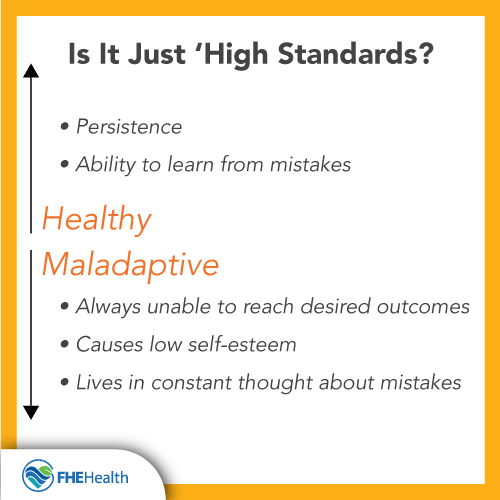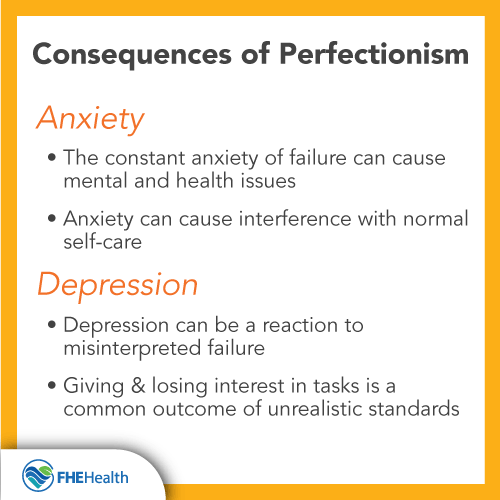
Many people set high goals for themselves and those around them. They expect not to just accomplish a task, but to do it perfectly. Some may say this is a personality trait; that they’re a perfectionist. However, being a perfectionist can go too far. When it does, it can create an increased risk for depression and anxiety. Overcoming perfectionism becomes critical to protecting mental health.
Do You Have Diagnosable “Perfectionism” or Just High Standards?
 It’s normal for people to strive to do a good job when completing a task. However, in some situations, it crosses the line to unhealthy behavior. When this happens, it’s critical to address the condition as it is, a form of obsessive-compulsive disorder.
It’s normal for people to strive to do a good job when completing a task. However, in some situations, it crosses the line to unhealthy behavior. When this happens, it’s critical to address the condition as it is, a form of obsessive-compulsive disorder.
Obsessive-compulsive disorder is a diagnosable condition. The National Institute of Mental Health reports an estimated 1.2 percent of adults in the United States have OCD, and it’s more common in women than in men. The organization defines OCD as a condition in which a person has uncontrollable and reoccurring thoughts and behaviors that they repeat frequently.
In the case of perfectionism, the condition becomes a diagnosable illness when these obsessions and compulsions dominate life. This is a condition known as atelophobia.
What Is Perfectionism in the Case of OCD
There are two forms of perfectionism. The first is adaptive and healthy and occurs when a person maintains high standards for themselves and others.
These people are also conscientious and rather persistent when they face any form of adversity. This is a healthy level of perfectionism and more in line with what people consider a personality trait.
Maladaptive or unhealthy perfectionism is another form. Here, a person is excessively preoccupied with doing things perfectly. They focus on past mistakes and are fearful and anxious about making mistakes.
They also constantly doubt themselves and the way they are accomplishing things. It can impact school, work and personal relationships. This form is unhealthy because it disrupts day-to-day life.
Perfectionism and obsessive-compulsive disorder have many similar qualities, including:
- A cycle of moving through excessive behaviors and anxious thoughts; a person feels compelled to focus on making changes or improving but never really reaches that ideal outcome
- Low self-esteem and low self-worth
- A significant amount of time dedicated to completing certain tasks, often putting other responsibilities on the line
- Engaging in a pattern of recognizing the negatives in situations, even when, to another person, those situations are positive
This is when a formal diagnosis is beneficial. It can provide an avenue for overcoming the condition.
What Is Atelophobia?
Atelophobia is unhealthy perfectionism, and it requires care. Atelophobia is a fear of doing something wrong or more specifically a fear of being imperfect in actions and attitudes. It is a phobia that impacts the way a person does everything, including the way they talk, how they make a phone call and the way they eat.
Over time, the condition can worsen, leading to self-esteem problems and a loss of self-confidence, and eventually the development of anxiety and depression in many.
When Has Your Perfectionism Gone Too Far? How Can You Change This?
 It’s understandable and allowable for a person to have high standards and goals, but in some people, this can increase stress levels and create hard-to-manage anxiety. Without care, depression and a drop in self-worth may follow. Finding a way to manage that fine line between wanting to do well and obsessing over the fear of failure can take time and effort.
It’s understandable and allowable for a person to have high standards and goals, but in some people, this can increase stress levels and create hard-to-manage anxiety. Without care, depression and a drop in self-worth may follow. Finding a way to manage that fine line between wanting to do well and obsessing over the fear of failure can take time and effort.
A key component of perfectionism treatment is learning how to manage anxiety and depression properly. This doesn’t have to change who you are or your personality.
It aims to bring your expectations to a more realistic level. This can help alleviate your feelings of anxiety and depression.
Managing Anxiety
With the help of counselors and therapists, you can learn how to manage anxiety-inducing situations. Perfectionism and anxiety require special treatment, such as cognitive behavioral therapy, which focuses on helping you recognize negative thought patterns. It then provides ways to change those behaviors.
For example, a person with perfectionism may feel anxiety when they notice something done improperly. Instead of immediately fixing the problem, through cognitive behavioral therapy the person learns to recognize the feeling of anxiety. They can then use coping methods to leave the “problem” in place and feel good about doing so.
Managing Depression
The same is true for depression. A person who struggles with perfectionism anxiety may have a very negative mindset. They feel like a failure for not getting 100 percent or doing something perfectly.
Learning how to stop being a perfectionist isn’t easy. Overcoming perfectionism requires a great deal of talk therapy and one-on-one counseling with a mental health disorder therapist. Over time, negative thought patterns can lead to depressive episodes, and people predisposed to depression may need more immediate help.
Depression isn’t something you have to live with and can be dangerous to self-treat. Therapists work closely with those facing depression to understand the underlying cause. In this case, perfectionism treatment can help to ease depression symptoms.
Overcoming Perfectionism With Treatment
With all forms of mental health disorders, it’s necessary to develop a customized treatment plan for each patient. With obsessive-compulsive disorders, as well as anxiety and depression, treatment may include some form of medication as well as psychotherapy according to the National Institute of Mental Health.
Unless severe depression is present, perfectionism treatment generally occurs on an outpatient basis. It works to uncover why a person feels like this. Then, patients learn how to reverse those thought patterns to create better and healthier decisions for themselves.
Men and women experiencing perfectionism, anxiety, depression or obsessive-compulsive disorder can seek help from FHE Health. Contact us today by calling (833) 596-3502. Our compassionate team of counselors is standing by to take your call 24/7.






